- Back to Home »
- Child of war, with a sense of purpose
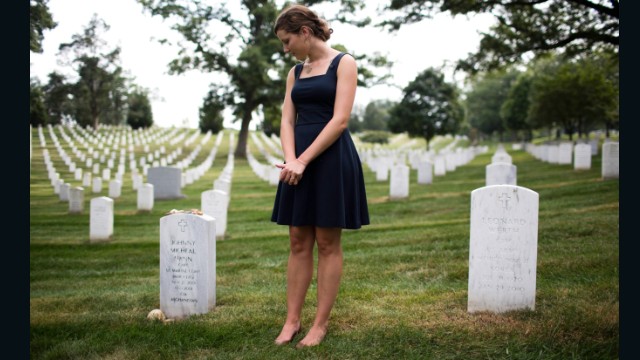
- Alison Spann's father was the first American killed in the Afghanistan war
- Alison, then 9, is now entering her senior year of college
- Every day, she says, there are "little reminders" of her loss
- Her mother died a month after her father: "I want to live my life for them"
Arlington, Virginia (CNN) -- Alison Spann walks purposefully behind the marble headstones, just as her father taught her.
He brought her here, to Arlington National Cemetery, as a girl. He pointed out the names of the dead and the wars that took their lives. He told her to look around and appreciate the sacrifice of the fallen.
The two walked together along the rows of headstones and turned when they got to a grave they were visiting. It was the proper way to walk in a cemetery, he told her, by not stepping where people are buried, a way of respecting them long after death.
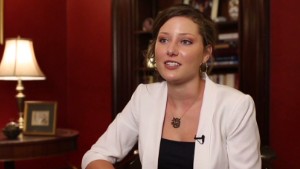 At age 9 both her parents died
At age 9 both her parents died Her father taught her many things. To be headstrong. To strive for a stellar education. To remember that a girl can conquer anything.
Today, Alison is the epitome of grace, her wavy brunette hair pulled back as she glides through section 34 of the cemetery. The whir of the nation's capital is drowned out here. Crickets chirp, cicadas buzz. A robin perches on a gravestone, almost as if watching.
As she reaches the fifth grave from the large oak, Alison turns and faces the headstone. It is her father's: Johnny Micheal Spann. Known as Mike, he died on November 25, 2001 -- the first American killed in the war in Afghanistan.
He was 32; she was 9 when dozens of friends, family and dignitaries came to Arlington on a frigid December day. They spoke of Mike Spann as an American hero, but she lost the man she considered her protector.
Etched in her mind is the final time she touched her father's casket.
On this summer day, she notes a road sign not far from his burial spot -- Grant Drive -- and finds peace. He told her Ulysses S. Grant was one of the greatest generals in American history and among his favorites.
"I knew he would've liked that."
The loss of her father was compounded 33 days later when her mother, Kathryn Ann -- "my best friend" -- died after a long battle with cancer.
Just like that, Alison was orphaned.
She comes to Arlington now to talk with her father about current affairs, to catch him up on her life. Raised by grandparents in Alabama and a stepmother she hardly knew, the fragile 9-year-old has blossomed into a thriving 21-year-old entering her senior year of college.
How she got to this point is testament to the strength of her parents and her dedication to their memories. Losing her mother and father, she says, "made me more resolved to do well, to really persevere in life and use the strength that they instilled in me in my own life, every day."
Yet for 10 years, she lived in denial. In her mind, she told herself her dad was on deployment and would one day return. It wasn't that she didn't believe he was dead; it was more about keeping the memory of her parents alive, for her own sake.
Then, one day last year, everything came crashing down. More than a statistic
Alison and her siblings -- Emily, then 4, and her half-brother Jake, then 6 months -- were the first children to lose their father in the Afghanistan war, which has claimed the lives of 2,264 Americans, many of them parents.
Some children adapt to the loss and figure out ways to press on amid profound grief; some excel, some flat-line, others become so devastated they can never fully function again.
The military has implemented an array of support programs for children experiencing such a loss, from grief camps to counseling. Yet there is no easy road map.
As the eldest child, Alison can still remember the lessons of her parents, yet she was still so young and impressionable when they died.
What might the country learn from her, a member of the 9/11 generation that has come of age with the nation fighting two wars?
She smiles and shows off a gold ring with a small emerald, her birthstone. Her father purchased some emeralds on one of his first deployments and had the ring made for her mother. Alison's mom gave it to her on the last Christmas that both of her parents were still alive.
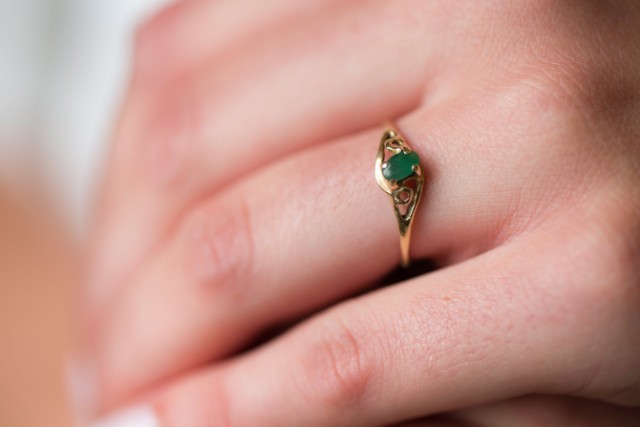
"That's definitely my most prized possession," she says, "because I feel it's part of both of them."
Her mother and father had divorced by then. Her father married a fellow CIA officer, Shannon Joy, in early 2001. Alison and her sister moved in with the newlyweds in Virginia, not far from CIA headquarters. Her mother was sick, fighting ovarian cancer, and also living in Virginia.
Alison chooses to remember happier moments, when her parents were together.
The two met at a party Mike threw at his parents' home in Winfield, Alabama. It was one of those parties kids have when Mom and Dad leave town. Kathryn Ann was a high school senior living in a neighboring town; he was a handsome young college student at Auburn University. A romance was born.
Soon, Kathryn Ann was driving her clunker of a pickup the three hours to Auburn University to see her new beau. Alison's father was reserved, with a dry sense of humor; her mother was his loud, outgoing alter ego -- as Alison puts it, "the whiskey to his Coca-Cola."
They wed and lived the military life on the move: Okinawa, North Carolina, Florida, Virginia.
At one stop, their cul-de-sac was nicknamed Sesame Street because so many children played in the road. One summer night, as the kids raced around in a game of tag, her father broke from his tough-guy persona. He chased after them and pretended he couldn't catch them. Her mother joined in.
"I caught myself looking back on that day a lot more often" after they died, she says. "That was one of the best memories of the two of them."
In a favorite photo, her father sports a tight military buzz cut and holds Alison in his arms. She drapes her arm around his neck as he kisses her. Daddy's little girl.
"You have so many different steps in life. You go to college, you go on your first date, you go to prom," she says. "Just things like that growing up are little reminders every day that my parents will never be here to do these things with me."
The final conversation
After Alison finished third grade in 2001, her father took her to an International House of Pancakes in Virginia to celebrate. A few months later, shortly after 9/11, he brought Alison and her siblings to the same restaurant. By then, she'd had time to adjust to the new living arrangements and the birth of her brother.
But this time, the mood at the IHOP was anything but celebratory.
Mike told his children he would soon deploy to Afghanistan. Alison had watched on television as the attacks of September 11, 2001, unfolded. Now her father was heading to the country that harbored the terrorists.
She couldn't understand why he would want to go.
In order for the terrorists not to ever come back here, he told her, we have to take the fight over there. She begged him not to leave.
It would be the last significant talk they ever had.
"The only thing I heard from that conversation," she says, "was that my dad was leaving and that he was going to a bad place. I was just crying and crying."
Mike, though, was living out his dream. At 16, he'd checked out a book from the library, went home and told his dad he would someday join the CIA. The next year, he earned his pilot's license. In celebration, he buzzed the football team during practice. He played wide receiver and running back.
He graduated from Auburn in 1992 and joined the Marine Corps as an artillery specialist, eventually earning the rank of captain. He switched over to the CIA in 1999 as a paramilitary officer.
Known as an avid parachutist, rescue diver and marksman, Mike was among the first Americans sent to Afghanistan to try to hunt down Osama bin Laden after 9/11.
By late November 2001, he was working with Northern Alliance troops at the Qala-i-Jangi compound, where hundreds of Taliban were questioned after capture. On November 25, he interviewed John Walker Lindh, the so-called American Taliban who would eventually be sentenced to 20 years in prison after pleading guilty to aiding the enemy.Two hours after that interview, prisoners carried out a revolt. Says Alison: "My dad was shot that day."
She was living in Virginia with her stepmother and siblings. She wasn't told why, but she was sent to her grandparents' home in Alabama. For a week, she wasn't allowed to watch the news or follow any current affairs, an odd thing since her father always stressed keeping up with world events. She didn't know it, but news outlets were reporting that her father was missing.She remembers watching a movie with her uncle when they were summoned into another room. Family members were gathered, crying.
Alison, your dad got hurt.Is he going to be OK? she asked.
No, he's never going to be OK.
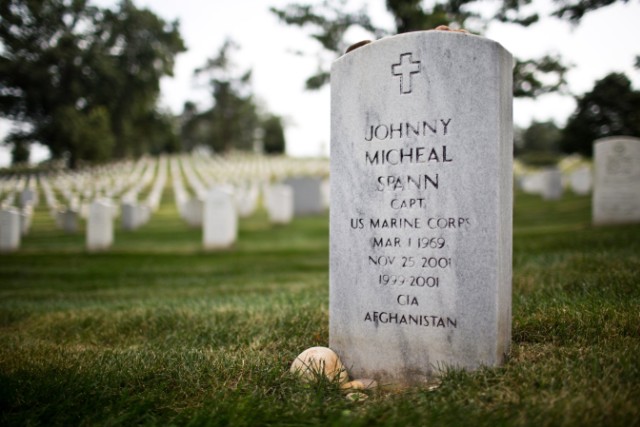
"They didn't really come out and tell me he died," she says, "but that's how they explained it to me as a 9-year-old."
Among those who attended her father's funeral at Arlington was Sen. Richard Shelby of Alabama. He noticed Spann's three young children and couldn't help but wonder what would become of them.
The value of life lessons
Alison didn't want to go.
We are taking a trip to Afghanistan, she was told. We are going to go see places where your dad was, where he was killed.
Her grandparents and stepmother were on their own journey through grief. Her father had told the family if he was ever killed to question everything -- even if he was really dead.
Alison's grandfather, the elder Johnny Spann, sought answers. Arrangements were made for the family to fly to Afghanistan and meet those who were with her father the day he died.
"I absolutely did not want to go," she says. "When the plane landed, I was beside myself."
At the tender age of 10, Alison stood in the spot where her father died. She glanced at the mud complex known as the Pink House where prisoners used grenades and AK-47s to break out and rush toward her father and other interrogators.
Perhaps the biggest lesson she learned from the trip was that not all Afghans were terrorists. She most remembers visiting an orphanage where widows cared for children.
"I think the people I met there impacted me more than the place did," she says. "My eyes completely opened to this world where, you know, everyone wasn't trying to bomb us and people weren't trying to kill us."
In her words, she learned everyone has a story.
Not lost on her was the fact her father died in a country where girls and women were denied equal rights. "My father was definitely about the strong, independent woman. ... He was definitely like, 'You go and get educated and get a job for yourself and make your own way in life.'"
Before she could do that, she had to grow up.
After Mike and Kathryn Ann died, her stepmom and grandparents decided all three of Mike's children should live together, at least for the next few years. Relations between children and a stepmom are tricky enough, let alone at a time of such vulnerability for everyone.
Shannon Spann had an infant, Jake, to care for and two stepdaughters to suddenly raise by herself. All the while, she grieved for her husband. "Before Mike and I got married," she says, "we prayed that God would make us a family, and we believe he did."
Yet Alison resisted. She fought back. She saw her stepmom as trying to replace her mother, and resented her. "I didn't want to have to deal with the fact that my parents weren't coming back."
Sometimes, she saw her stepmother crying, and couldn't understand why. "I was angry at her," Alison says. "It reminded me that it was real, and I didn't like that."
Her stepmother sees it differently.
"I wanted for us all to grieve together and for them to see the hard reality of that," says Shannon, who left the CIA in 2009.
Still, she admits she wasn't always as sensitive to Alison about the death of her mother "because I wanted to have that relationship with her -- and I regret that part."
"It's something grown-ups can't really appreciate," Shannon says, "the impact of what that really means to a 9-year-old girl, to lose both her natural-born parents within a month of each other."
The new family first lived in Virginia and then Australia, where they stayed from the time Alison was 10 to 13 while Shannon was on a CIA assignment.
Alison never told friends in Australia that her parents were dead. She just couldn't go there.
"It was just too much for me to comprehend."
After the family returned to the States, Alison spent her freshman year of high school at Langley High in McLean, Virginia. She became best friends with Becky Card. They attended football games, basketball games, chatted about boys. Becky says they "talked about everything normal kids do."
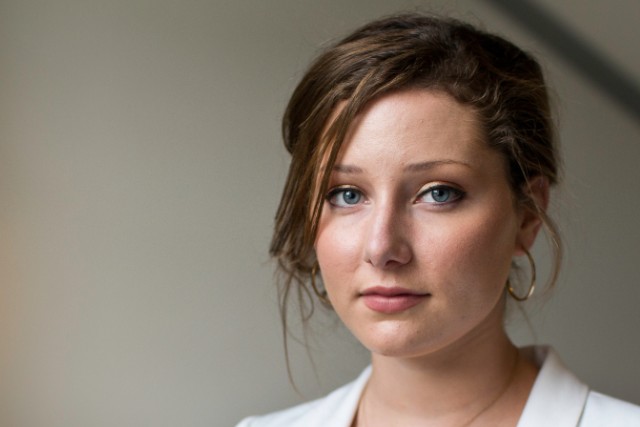
Sometimes, Alison would confide in Becky. "I had never had a friend who had endured so much in a lifetime. I was amazed she wasn't screwed up over it," Becky says.
Alison's life as a rolling stone continued. After her freshman year, she and her sister moved in with their grandparents in Alabama, a way of better connecting with her parents. Her half brother, Jake, remained with his mother, Shannon. Though they lived apart, Alison stayed in touch with her brother: "He looks just like my dad."
In Winfield, she finally felt at home. She attended the same school as her father. She excelled in academics and in track.
Her grandfather, Johnny Spann, found himself driving the girls to ball games, cheerleading practices, track meets, the movies -- at a time when all his friends were going on cruises and heading off to the golf course.
It was a job he relished.
I can never be your dad because you had a dad, he'd tell them, but I can try to do those things that your dad would've done for you.
He told them about their dad checking out the book at age 16 and knowing then that he'd join the CIA. He told them how their dad flew his airplane over football practice after he got his pilot's license.
He told them that kids screw up all the time -- and that when they did, just apologize. He told them to look around Winfield and talk with the town elders about what life had taught them.
Life's lessons are a whole lot better than reading out of a textbook, their grandfather would say, if you just listen to somebody tell it.
That was one of the things he stressed most, to listen and learn.
"I've always tried to use examples of people who were successful in life and what they did different than other people that made them stand out," he says. "I tell them all the time: Y'all have lost your mom and dad, and it sucks. There's just no way to say it; it's just bad. But you have to play with the cards you're dealt."
At 65, he's proud of how well his three grandchildren, especially Alison as the oldest, are doing in life. In Alabama-speak, "They've got their heads screwed on right."
"But I guess I've always been real positive that they would excel."
When grief strikes
Alison attended the University of Alabama for a semester before heading on to Pepperdine University in Malibu, California.
At one point early on, she and her Pepperdine suitemates gathered around to tell each other their life stories. Much of it was normal college banter: problems with parents, sibling rivalries, difficult boyfriends.
Then came Alison's turn to speak. Usually she kept her story to herself, but this time she told everything. "It felt good to open up to them, because trying to keep that kind of thing under wraps around people that I live with 24-7 would have been a huge burden. Those same people are still my closest friends."
One of them, Jordan Willner, still remembers that day and how everyone else "kind of wished we could take our stories back because it doesn't even compare."
"No one would ever guess in a million years that this girl has no parents," she says, "because she has such a high spirit about life."
It's strange how grief works. It differs with each person, each child. And when it comes, it can be paralyzing.
Alison had never really cried over her parents' deaths. It was as if she had tucked her sadness into a remote part of her brain. Mom and Dad will come back, she told herself.
"I just sort of put that in the background as if my parents hadn't died," she says, "and that caught up with me."
During her sophomore year, she spent a semester abroad in Italy. Traveling overseas wasn't unusual. She had vacationed in London and visited her friend Becky Card in Paris, and she loved it.
Yet there in Italy, she learned that the mother of one of her friends had died of cancer. Then, she was on Facebook when friends in Alabama started posting news of a 16-year-old boy who had been killed in a car crash in a neighboring town.
She didn't know the boy, but she flashed back to when her parents died: the rush of people at the house, the gifts, the flowers, the food.
Alison cried for a week. She couldn't leave her room.
Friends and family rallied around her. Her stepmother told her she was finally confronting her grief in ways she hadn't 10 years earlier: "This is you dealing with stuff that you never came face to face with."
"I just thought about this little boy's mom and the fact that she sent her 16-year-old son out for a night with his friends and he got into a car accident and never came home," Alison says. "It was the hardest thing for me."
Her grandfather and her friends encouraged her to stick out her semester abroad. She did. She considers the experience one of the greatest of her life.
'She's setting an example'
Wearing a navy sundress and white blazer, Alison exudes poise and confidence inside Sen. Shelby's office in the Russell Federal Building, where she interned this summer.
The senior senator from Alabama says he's proud of her father "and what he stood for." He's equally proud of the young woman she's become.
"She's strong. She's steadfast. She has purpose and she's setting an example out there," Shelby says. "If her father was here, he'd be proud of her."
Alison is being put through college with the help of the CIA Officers Memorial Foundation and the Marine Corps Scholarship Foundation, nonprofit groups that use private donations to help children of those killed serving the nation.
She's majoring in communications and political science. She's thought of becoming a news anchor but isn't so sure now. There's still time to figure out what lies ahead.
Her parents taught her to be driven -- to chase her dreams. "When I feel there's an obstacle I can't overcome or something's too hard or I'm not good enough for something, I think about, 'You know my dad thought I could do it. My mom thought I could do it. So I know I can do it.'"
Children of the fallen, she says, should consider the fact that their parents can't live out their lives, so they should follow their own dreams.
"I think back on my mom and dad, and all the obstacles that they were able to get through in life and just how strong and determined they were. I want to live my life for them."
Interning in Washington allowed her to make weekly visits to Arlington. "Most cemeteries scare me, but I've never been scared here."
Small pebbles sit atop her father's grave -- a token of love and appreciation left by people she's never met. It's nice to know, she says, that others still miss him, too.
On summer days, when the wind whips her hair and the oak leaves rustle, she can sense her father's presence. She tells him she loves him.
She once read a note left by a widow on another grave. It said, "If love could've saved you, you would've lived forever."
She thinks back on that note, she says, because it applies to her father, too.
On this day, she walks down Grant Drive, hooks around onto another road and walks through the McClellan Arch, once the cemetery's main entrance. There on the arch is the message relayed to her by her father so many years before:
Rest on embalmed and sainted dead, Dear as the blood ye gave,No impious footsteps here shall treadOn the herbage of your grave.
Alison leaves alone. A legacy of her parents. A legacy of war.







